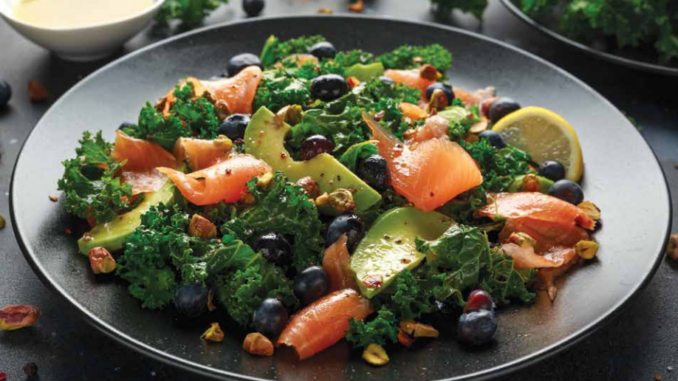
The 2020 US Dietary Guidelines recommend healthy eating patterns, “combining healthy choices from across all food groups — while paying attention to calorie limits.” Research has shown that doing so can reduce risk of high blood pressure, heart disease, diabetes and certain cancers. In addition, there are many nutrient-packed “superfoods” that are must-haves in your diet as you work toward achieving health benefits and reducing chronic disease.
BERRIES
High in fiber, antioxidants and disease-fighting nutrients, berries are a sweet addition to any diet. Think blueberries, raspberries and strawberries. Even when they are not in season, you can buy them frozen and add them into your diet for a healthy snack. Eat them plain or add them to yogurt, cereal, oatmeal or smoothies.
FISH
Fish are a good source of protein and omega-3 fatty acids, which help prevent heart disease. Fish with the highest omega-3 content are salmon, tuna steaks, mackerel, herring, trout, anchovies and sardines. Remember that adding loads of butter and salt to your fish can cancel out the health benefits.
LEAFY GREENS
Dark, leafy greens are a good source of vitamin A, vitamin C and calcium. They also include fiber and several phytochemicals that can have a positive impact on your overall health. Dark lettuces are great additions to any salad, but don’t forget varieties such as spinach, Swiss chard, kale, collard greens or mustard greens. Sauté them with olive oil or add them to soups and stews for a super addition to your diet.
OLIVE OIL
Speaking of olive oil, this cooking addition is a good source of vitamin E, polyphenols and monounsaturated fatty acids. All of these can help to reduce the risk of heart disease. You can substitute butter or margarine with olive oil in pasta or rice dishes. Drizzle over vegetables or use as a dressing to reap the benefits of this superfood.
NUTS
Most nuts contain monounsaturated fats, which may be a factor in reducing the risk of heart disease. Hazelnuts, walnuts, almonds and pecans, specifically, are great sources of plant protein. You can easily add a handful to oatmeal or yogurt or have as a standalone snack. Consider trying the various types of nut butters such as peanut, almond and cashew, as well.


